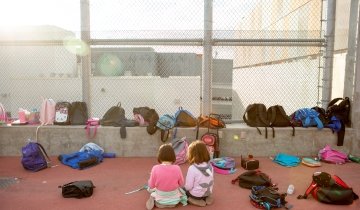With social media use among many youth nearly constant, we often read reports of the adversities that young people encounter online, from impacts on their mental health to the dangers that meeting malicious strangers in real life can pose. While the negative effects of social media usage for teens should not be discounted, there are some benefits for Black and Latinx youth in particular as they navigate their ethnic-racial identity (ERI) online. Brendesha M. Tynes, Dean's Professor of Educational Equity at the USC Rossier School of Education, is a co-author of a newly published article led by Naila A. Smith, assistant professor of education at the University of Virginia, and supported by Daisy E. Camacho-Thompson, that shows how the race/ethnic- and civic-related online experiences of Black and Latinx adolescents are connected to their ERI development.
Black and Latinx youth tend to spend more time engaged online than their White peers, and they also spend more time than youth of other ethnic-racial groups making sense of what their ERI means to them and engaging civically and politically online. Exploring and seeking out information about one’s race/ethnicity, refining how one understands one’s race/ethnicity, and feeling positively or negatively about one’s race/ethnicity are factors in ERI development.
Research on Black and Latinx adolescents’ online experiences has shown that they do face additional risks such as online racial discrimination and hate and viewing traumatic racial content. Online social connection can help Black and Latinx youth cultivate a sense of belonging to a social group that may help them make meaning of their identity as they encounter some of the harms in online spaces. This newly published article builds on some of Tynes’ previous work about how content youth are exposed to online impacts their ERI exploration.
Using data from the Teen Life Online and in Schools Project (TLOS), which Tynes directs, Smith and her team found that youth who can establish relationships online with friends of the same race/ethnicity experience more adaptive outcomes over time, meaning that in fostering online relationships with same-age, same ethnic/racial group peers these young people can better cope with some of the harmful information that they encounter online.
Tynes’s TLOS data was one of the first datasets to investigate teens' online experiences across multiple years (three years) using both survey and interview data and a multi-racial sample of adolescents. While Tynes created the dataset, her collaborators and mentees led studies that were not previously included in the original proposal.
Smith’s research interests include the development of racial and ethnically minoritized youth over time. She was curious about youths’ experiences in the online space over time and sought to examine the role of socio-cultural resources and assets in the experiences of Black and Latinx youth.
“I was really interested in examining what factors contributed to ethnic-racial identity development, which is a sociocultural asset for Black and Latinx youth. In examining aspects of youths’ race- and civic-related online experiences and looking at how young people curate or create online spaces that meet their needs, we were able to show that there are these different ways that Black and Latinx adolescents are engaging online in their exploration of their world and their ethnic-racial background,” said Smith.
The study also found that earlier online activity is connected with ERI development one year later, meaning that race and civic-related online activities are important for young people’s feelings and behaviors in terms of their future ERI. Having a clearer idea of what their ERI means to Black and Latinx youth is associated with having better outcomes academically and mental health benefits.
“A major goal of the TLOS Project was to see what cultural resources youth bring to online spaces that might buffer them from some of the negative outcomes we might see that have been published in journals and in news articles. I wanted to paint a more holistic view of young people’s experiences online,” said Tynes. “Most of what we have published has been on the negative side, but I’m excited to have this manuscript focus on the positive experiences that young people are having online.”
Smith started her collaboration with Tynes because of her advocacy for students and her deep knowledge of youth development. The two met at an academic conference when Smith was a graduate student.
“I wanted to meet Brendesha specifically because she was the foremost scholar on the online experiences of Black and Latinx youth, and I wanted to develop my expertise in the role of the internet in youth development. Her tremendous productivity and creativity are built on deep knowledge of a wide range of fields that inform her innovation in thinking about how we can support Black and Brown youth in their development specifically in online spaces,” concluded Smith.
Smith and her co-authors want teachers and parents to know that Black and Latinx youth can benefit positively from the time they spend online, and that access to online information and experiences can support meaningful identity exploration. According to Smith, parents and teachers can help guide youth in their online ERI exploration and engage them in conversations about what they are learning to help them process the information that they are consuming. In schools where Black and Latinx youth may be in the minority or where they may not have access to materials in the curriculum that allow them to learn about their cultures and identities, supporting online activities around ERI is even more critical.
“With new laws banning certain books or talking about Black people’s history in the classroom in some states, people have to make an effort to make sure that kids are getting what they need to explore who they are,” said Tynes. “The digital literacy that young people need to sift through stereotypes and misinformation about their racial-ethnic group becomes more important in these places where the students cannot rely on their teachers to provide accurate information.”
The team’s findings may be used to support the creation of interventions to help adolescents create and curate online spaces where they can meet peers in their age range and ethnic/racial groups to help them with their relationship-building skills.
“Instead of the internet being a place where people are in constant danger, youth can craft spaces where their experiences are actually beneficial for their development, and these young people are doing that on their own,” said Tynes. “Parents and educators can support that exploration and provide guidance.”
Tynes is supporting that guidance by building a digital literacy and mental health intervention with a $4.6 million Transformational Research Award NIH grant. With the funds, Tynes seeks to research and provide adolescents with tools to cope with the negative messages they receive online and the skills to use digital media as a tool to excel in school. Tynes’s goal is to help youth thrive in their everyday lives as they navigate digital spaces. The newly designed, first-of-its-kind platform will have several modules and virtual reality experiences to help adolescents practice how to respond to some of their experiences online. The alpha version of this intervention is scheduled to launch in September 2024.





